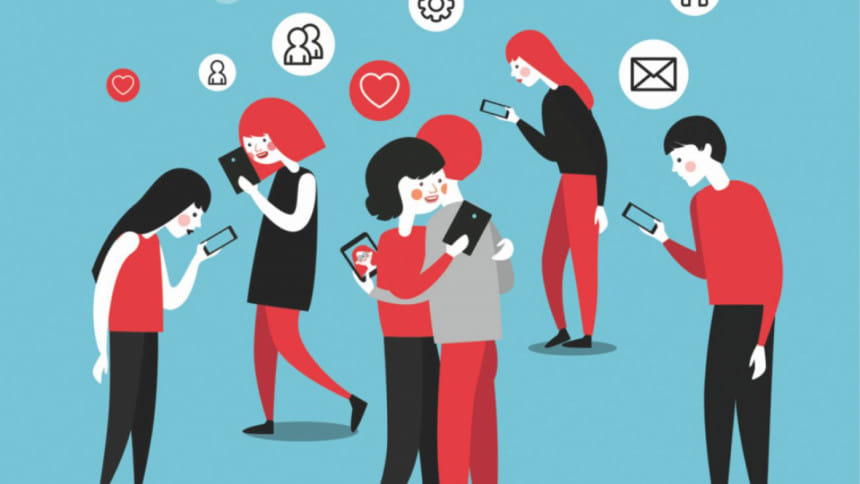Facebook for escapists or escapees?

There is no doubt that Facebook represents an alternate reality that many of us like to escape to. It gives one a glimpse into the day-to-day lives of people we cannot see face to face—because they are thousands of miles away; because they are only a few miles away but the traffic makes sure that you reach them in the same time as it would take you to fly to another country; because although the person is right in front of you, you just can't look them in the face and say anything. It makes one wonder why married couples must declare their unquestionable adoration for each other on Facebook. Do they not see each other every single day of their lives? Perhaps they are just too shy.
Certainly shyness is the last thing you see in a Facebook post. And why not? Have you ever seen anyone post an unflattering picture of themselves? Yes other people may put up unflattering photos of you—pictures in which they look like glamorous actresses and you look like a tornado took a pit stop on your hair before moving on. But be frank, if you had to do it wouldn't you put the best shot of yourself, standing at an angle that perfectly camouflages those love handles, hair perfect, make up perfect, skin airbrushed and face contoured with that special app that is so less painful than plastic surgery? If not, then perhaps you just don't belong to this world of the happy, bold and beautiful where everyone "likes" everyone, and "loves" everything they do. It is a place to "share" your accomplishments with your friends—awards, trophies, recognitions, degrees, marriages, anniversary celebrations, etcetera etcetera etcetera.
It is not a place to tell your friends you are in the middle of a messy divorce, that you are practically bankrupt or that your husband fancies your best friend and always has. Which is how it should be perhaps since Facebook is a public forum—like a party where you try to put up your best face and socialise with only those you want to mingle with while judging others about their clothes, looks, partners, even the way they spell (lol)—a magical place where you can just vanish unceremoniously without saying a single goodbye.
Hence the complacency of some delusional fools, who think they can kill (yes murder) people, even be convicted in court and then post pictures of their birthday party in Malaysia on Facebook. A report in this paper has found that four convicted killers of Zubair Ahmed, a university student who was brutally killed, did exactly that. To make things a little clearer, Zubair belonged to a faction of the Chhatra League and his killers were from an opposing faction of the same organisation.
Let's not get into why members of the same league have factions and what motivates them to kill each other or why—pray why must they pretend to be university students when they are aspiring to be Kala Jahangir? No, let's ask why they would think that they would not be exposed if they posted their pouting pictures on Facebook? This is surely a mystery. After all, these young men have been convicted of murder, had escaped from the lower court and reported as absconding. And now they are posting their New Year pictures in nightclubs, commenting what a pity it was that his fellow countrymen in Bangladesh could not even hold a rooftop party because of the government ban. In case anyone had doubts about whether the four were "friends in deed"—one of them even posted a group photo of all four at a Cineplex in Kuala Lumpur. How they disappeared (willingly of course) from the lower court, got to the airport, went through immigration and boarded a plane to Kuala Lumpur completely undetected, we do not know. Neither do we know why there was no arrest warrant for two of the killers who had been sentenced to death in court or why the police have not made any effort to bring back the murderers from Malaysia, a fact everybody seems to know, thanks to social media. In another eerily similar story, five of the 13 convicted killers (members of Chhatra League) of the ill-fated young man Biswajit Das who was mercilessly hacked to death by them, also posted on social media, even though they had been awarded death sentences or life terms by the court. At least four of them had social media posts from places in Dhaka.
So are people so caught up in the virtual reality of social media that they forget that this media is also connected to the real world? That people will know that you were partying away at Westin when you said you had an E Coli poisoning from a misguided enthusiasm for street side chaltar achaar and hence could not make it to the wedding reception. Or that people, maybe even the police, will see that even though you are a fugitive convicted of murder, you are taking a selfie at the mall in Dubai.
So what's going on? Have people lost all their grey matter?
The answer to that question is pretty obvious, don't you think? Well not exactly. Yes those ordinary fools who post pictures of every second of their lives are perhaps not the most brainy of individuals since they do not realise that they are providing vital information to "certain powerful groups" who take surveillance to pathological levels so that even an innocuous "share" can become case for sedition/defamation/blasphemy.
But what about the other group—those hormonal hooligans who seem least bothered that they are exposing their hideouts even though technically they are fugitives from the law and face death or life imprisonment if they are caught? Are they really that pea-brained? One would think not. Perhaps they belong to a group that enjoys unusual diplomatic immunity that allows them to extort, maim or even kill, not be held accountable and guaranteed a free pass to a foreign safe haven. Perhaps even the fact that they are gleefully active on social media will not make much of a difference to the protectors of law who have the capacity to trace them and bring them back to face justice.
One cannot help but wonder what will happen with the introduction of the specialised police unit which will employ more than 500 skilled personnel and includes a sophisticated software that will be able to detect cybercrime through a single incriminating word—say, "atheism" or "fascist". Will these super cybercrime-busters catch those who have killed people and disappeared only to reappear on social media? Or will they do an even better job than their predecessors by weeding out troublemakers who dare to express opinions that do not conform to the current politically elite school of thought? That indeed, is the question.
Aasha Mehreen Amin is Deputy Editor, Editorial and Opinion, The Daily Star.










Comments